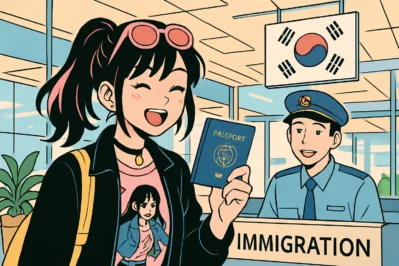Hello! This is Maeil Hangeul, here to upgrade your Korean skills!
Have you heard about the sensational new movie, “K-Pop Demon Hunters”? Lately in Korea, everyone is talking about the K-pop group HUNTRIX and their rivals, the Saja Boys! The movie has made so many people want to fly to Korea right away. But before you can visit the filming locations or see a concert, there’s one important step: passing through immigration!
Today, we’ll learn essential Korean phrases to help you breeze through the airport immigration process smoothly and confidently. Let’s get started!
Key Expressions for a Smooth Entry
Here are some phrases that will make your airport experience super easy.
1. (으)러 왔습니다 (-(eu)ro wat-sseum-ni-da)
* Pronunciation: [eu-ro wat-seum-ni-da]
* English Meaning: I came here to… / I’m here for the purpose of…
* Detailed Description: This is the perfect grammar pattern to state your reason for visiting. It’s polite and clear. You attach -으러 to verb stems ending in a consonant (e.g., 찾다 -> 찾으러) and -러 to verb stems ending in a vowel (e.g., 보다 -> 보러).
* Example: 여행하러 왔습니다. (Yeohaenghareo wat-sseum-nida.) – I came here to travel.
* Example: 공연을 보러 왔습니다. (Gongyeoneul boreo wat-sseum-nida.) – I came here to see a concert.
2. 방문 목적 (Bang-mun mok-jeok)
* Pronunciation: [bang-mun mok-jjeok]
* English Meaning: Purpose of visit
* Detailed Description: This isn’t a full sentence, but a crucial vocabulary pair you’ll see on the landing card and hear from the immigration officer. 방문 (bangmun) means ‘visit’ and 목적 (mokjeok) means ‘purpose’. If the officer asks, “방문 목적이 무엇입니까?” (What is your purpose of visit?), you can answer using the pattern from #1!
3. ~동안 있을 거예요 (~dong-an iss-eul geo-ye-yo)
* Pronunciation: [dong-an it-eul geo-ye-yo]
* English Meaning: I will be here for (period of time).
* Detailed Description: This is how you answer the common question, “얼마나 머무를 예정이세요?” (How long do you plan to stay?). Simply put the duration of your stay before 동안 (dongan). This is a standard and natural-sounding reply.
* Example: 일주일 동안 있을 거예요. (Iljuil dongan iss-eul geo-ye-yo.) – I will be here for one week.
* Example: 한 달 동안 있을 거예요. (Han dal dongan iss-eul geo-ye-yo.) – I will be here for one month.
Example Dialogue at the Airport
Let’s see how these expressions work in a real conversation.
- A (Immigration Officer): 안녕하세요. 여권 보여주시겠어요? (Annyeonghaseyo. Yeogwon boyeojusigesseoyo?)
- Hello. May I see your passport?
- B (You): 네, 여기 있습니다. 방문 목적은 관광입니다. (Ne, yeogi itsseumnida. Bangmun mokjeok-eun gwangwang-imnida.)
- Yes, here it is. My purpose of visit is tourism.
- A (Immigration Officer): 알겠습니다. 한국에는 처음이세요? (Algesseumnida. Hangug-eneun cheoeum-iseyo?)
- I see. Is this your first time in Korea?
- B (You): 네, 처음이에요. 요즘 유행하는 ‘케이팝 데몬 헌터스’를 보고 여행하러 왔습니다. (Ne, cheoeum-ieyo. Yojeum yuhaenghaneun ‘Keipap Demon Heonteoseu’reul bogo yeohaenghareo wat-sseumnida.)
- Yes, it’s my first time. I watched the popular movie ‘K-Pop Demon Hunters’ and came here to travel.
- A (Immigration Officer): 아, 그러시군요! 재미있게 보셨나 봐요. 얼마나 머무르실 건가요? (A, geureosigunyo! Jaemiitge bosyeonna bwayo. Eolmana meomureusil geongayo?)
- Oh, I see! You must have enjoyed it. How long will you be staying?
- B (You): 2주 동안 있을 거예요. (Iju dongan iss-eul geo-ye-yo.)
- I’ll be here for two weeks.
- A (Immigration Officer): 네, 즐거운 여행 되세요. (Ne, jeulgeoun yeohaeng doeseyo.)
- Okay, have a wonderful trip.
Culture Tip & Trend Deep Dive
The success of “K-Pop Demon Hunters” is a perfect example of the Hallyu (Korean Wave) effect! Just like in our dialogue, mentioning a popular K-drama or movie can be a great icebreaker.
Did you know? Stating your purpose of visit as “to see a concert” (공연 보러) or “to attend a fan meeting” (팬미팅에 참석하러) is a very common and perfectly valid reason for young travelers coming to Korea. Immigration officers are very used to hearing this!
In fact, if you say you’re here because of “K-Pop Demon Hunters,” you might even get a smile or a friendly comment. It shows you’re interested in current Korean culture. So don’t be shy! Using pop culture references can make interactions feel more personal and friendly. It shows you’re not just a tourist, but a fan who appreciates the culture.
Let’s Practice!
Time to check what you’ve learned. You can do this!
- Fill in the blank: You are visiting Korea to learn Korean. How do you tell the immigration officer?
한국어를 ________ 왔습니다. (Hangugeo-reul _________ wat-sseumnida.)
- Make a sentence: You plan to stay in Korea for 10 days. How would you say this?
That’s all for today! You’re now ready to enter Korea with the confidence of a K-Pop star (or a Demon Hunter!).
Try using one of today’s phrases in the comments below! Tell us why you want to visit Korea. See you next time at Maeil Hangeul






